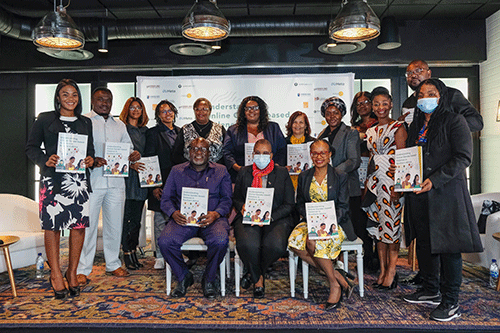Online violence is real violence, and should be considered a serious emerging human rights challenge. It can take the form of public shaming, doxing, harassment, cyberstalking, intimidation and many others.
Online gender-based violence is a pervasive and deeply disturbing problem.
Doxing is when someone’s private information is published on the internet against their will.
Online violence also poses a serious challenge to the achievement of the United Nations Sustainable Development Goal five, which aims for the total eradication of gender-based violence.
These sentiments were shared by justice minister Yvonne Dausab at the launch of the SADC report on understanding online gender-based violence in the capital last week.
“Access to the internet has become an essential component of our everyday lives. But while our newfound connectivity comes with immense opportunities, it also presents tremendous challenges.
We are also currently working on a Bill to address cybercrimes. It will create a new offence for online communications that make credible threats of violence, intend to cause serious emotional distress, make a false statement intended to harm the reputation of another person, makes explicit sexual suggestions, or contains any explicit photos of a person without their consent. These acts will be subject to a fine of up to N$10 000, or imprisonment for up to two years,” she explained.
Dausab added that the Maputo Protocol aligns with the 1979 Convention on the Elimination of All Forms of Discrimination against Women (CEDAW). It was the first Human Rights treaty to examine cultural change as a means of eradicating gender-based violence. In Namibia, as in many other countries, the ratification of this convention is legally binding, and obligates state parties to work towards the achievement of these goals.
The chairperson of the Fourth Industrial Revolution (4IR) Task Force, Professor Anicia Peters, said rapid digitalisation perpetuates stereotypes, racism and inequalities towards women as well.
“It creates a breeding ground for what we are talking about here. It’s online violence against women because it makes the perpetrators being able to sit anywhere in the world and be completely anonymous while targeting our kids as young as 13, as young as 12, as young as 11, because they are coming online,” she shared.
Peters said “it makes it very easy for predators and perpetrators of violence to use that as a platform against women. What we can do to mitigate online violence is to start to become the designers and creators.”
The chairperson of the parliamentary standing committee on ICT and Innovation Modestus Amutse believes legislators have the duty to ensure that online users such as women and girls are safe when making use of the internet, especially now when online learning and job-seeking have become more convenient during the pandemic.
“It is saddening to comprehend that an innovative tool like the internet was created to simplify our lives, but is now being used to trick and endanger innocent online users in the form of cyberstalking, cyberbullying, hate speech and blackmail, to such an extent that women and girls have either attempted to tragically end their lives, or have unfortunately succeeded in committing suicide to escape their online abusers,” he stated.
The committee commits to ensure that all ICT bills are thoroughly scrutinised, to safeguard that adequate and comprehensive laws are enacted to deter such crimes, protect women, girls and boys, and further ensure that law-enforcement agencies are equipped and empowered to apprehend and prosecute such offenders to the fullest extent of the law.



